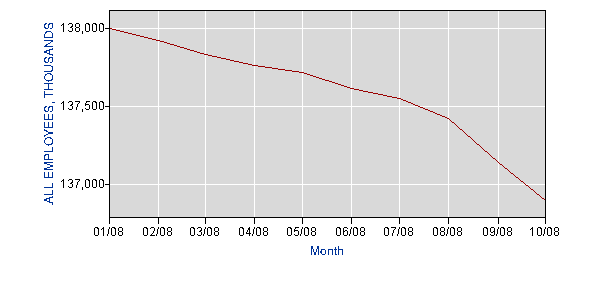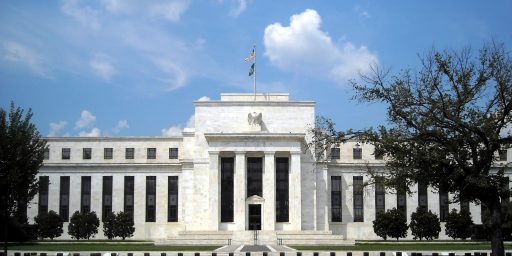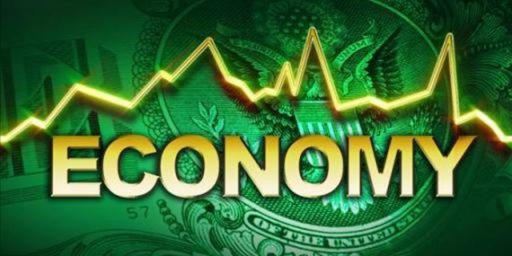Fed Lowers Economic Forecast, May Cut Rates
The Federal Reserve is lowering its forecasts for economic activity.
WASHINGTON (AP) – The Federal Reserve on Wednesday sharply lowered its projections for economic activity this year and next, and signaled that additional interest rate reductions may be needed to help combat the worst financial crisis to jolt the country in more than a half-century.
With the economy forecast to lose traction, or even jolt into reverse, unemployment will move higher, the Fed predicted.
Facing the likelihood of “significant weakness” in the economy, some Fed officials suggested “additional policy easing could well be appropriate at future meetings,” according to documents from the Fed’s most recent closed-door deliberations on interest rate policy at the end of October.
[…]
To help ease financial turmoil and spur banks to lend money more freely again to customers, the Fed has taken a series of other unprecedented steps, including offering short-term cash loans and buying up mounds of short-term debt that companies rely on to pay day-to-day expenses like payrolls and supplies.
Under its new economic forecast, the Fed now believes gross domestic product could be flat or grow by just 0.3 percent this year. GDP could actually shrink or expand by 1.1 percent next year. Both sets of projections are lower than the Fed’s forecasts delivered to Congress in July.
[…]
The prospects for weaker economic activity will push up unemployment. The Fed projected that the national unemployment rate will rise to between 6.3 percent and 6.5 percent this year. The rate in October was 6.5 percent, and last year the rate averaged 4.6 percent.
Given news like this I have to say that it will be interesting to see if Obama is going to stick to his statements about holding off in implementing his tax plan.
While the National Bureau of Economic Research has not announced whether or not the economy is in a recession I think it is a safe bet to conclude that we are in a recession. GDP decreased last quarter. The non-farm payroll has declined for 10 straight months in a row. Unemployment insurance claims are up.
Unemployment has been rising steadily since the start of the year. In January unemployment was 4.9% and now it is 6.5%. Citigroup is laying of 50,000 employees. The auto-industry is begging for money or they too will be laying of thousands of employees. Real personal consumption expenditures have been zero or negative from August through September. This is significant in that personal consumption expenditures (PCE) make up just under 71% of GDP. If PCE goes negative it does not bode well for GDP. If PCE is negative again for October and November it will likely mean that GDP is going to be very low and/or negative. So far the only bright spots I’ve heard of are that the CPI is sharply down and real earnings were up from September to October.






It seems to me that the serious longterm problem is the failure of our economy to create jobs. For the last six or seven years the number of new jobs added to the economy has barely kept up with the natural increase. If that pattern continues, it’s hard for me to see how those who lose their jobs during the current turndown ever get back into the job market.
The economy is in freefall, but Bush is focused on doing as much damage to the environment as humanly possible while Rome burns around him.
One constant about Bush, every time you think he has hit bottom, that he could not possibly be any worse, you are wrong.
Is it? I’m not sure the evidence is that clear. I keep hearing complaints about “the greatest economic crisis since the Great Depression” which it most certainly isn’t.
What is true right now is that the financial system is in the greatest crisis since the 1930’s. The economic system hasn’t gone that far. It may still but it hasn’t yet.
It seems to me that we need to deal with what is happening rather than with what might happen and that hyperventilating about the latter contributes to bringing it to pass.
Not being an economist(Thank God I escaped that burden of being wrong more than right)I would think that the Dems program of “not drilling” sent the oil and gas prices sky high whereby the destruction to our economy was begun. It was only exacerbated by the Dems big bully pulpit (the CRA) forced sub prime mortgage failure which destroyed the housing market, whereby the rest followed. Bush will get the blame from the same people that ignored or denied Clinton’s poor economy he handed to Bush.
It didn’t help to have Bush demanding instant bailouts and stimulus packages which make the taxpayer the Daddy Warbucks of first resort.
Re. “free falling”
I think this is a time of great risk, and that it’s possible that we are in a slow free-fall. Time will tell.
Possibly you are looking at “the real economy” when economists are looking credit markets and etc. There’s a lag between the two.
One thing that’s interesting to me is that we’ve started to break through the “worst since the depression” articles, and see some “like the depression” pieces. I don’t have a pointer handy, but I read the top econ blogs and have seen them pop up.
Time’s Obama as FDR cover is also a strong indicator of pop-consciousness going that way.
Will you trust me if I tell you this as a centrist Republican (still!)?
We can be fairly confident now that the oil surge was an investment bubble. Prices surged faster than (admittedly expanding) demand. They are falling now, not because we started off-shore drilling, but because the tulip bubble popped.
On real causes of the credit crisis, I think the two This American Life Pieces are still the best introductions available:
The Giant Pool of Money
Another Frightening Show About the Economy
BTW, the Giant Pool of Money was probably the stimulus for the commodities bubble. There was entirely too much money out there looking for higher-than-Tbill returns.
Things are settled down now because the Giant Pool is fearful enough to accept Tbills … but the pendulum has swung too far. Now too much is in safe investments and not enough is being sent toward the real economy …
I’ve been making the “Giant Pool of Money” argument for some time. One thing to keep in mind: the big Chinese “state-owned” banks are incredibly opaque. We (and probably they) have no idea what they’ve got sitting around in cash reserves.
I’ve long suspected that quite a bit of that money has been siphoned off to buy California real estate. Neither we nor they really have any way of knowing for certain.
I haven’t heard of that down here in OC. I had heard, as the tech bubble peaked, that people from NorCal were flying in for a weekend, buying three houses, and leaving again.
The bubble is not purely Chinese after all.
What the Hell does “slow free fall” mean? That the economy is slowly contracting? If so that describes every recession.
The textbook for “free fall” is probably “without support.”
Have you spotted support? That would make us all breathe easier.